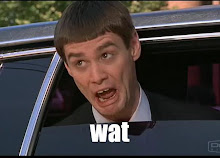The class itself is based around the theory that American journalism acts as a so-called "fourth estate" to our government. While we've all been taught the three branches (legislative, executive, and judicial), journalism acts as a fourth branch in that it (when properly practiced) provides a source of oversight for the general public.
Yesterday our professor, Frank Durham, introduced us to another theory. It focused on how our press is, especially in times of crisis, manipulated and censored through "cycles of fear." The cycle has five points and all are scarily true. They were true when journalism was in it's infancy, they are true today, and chances are they'll be true twenty years from now. With no liberal or conservative bias in my statements today, this is what will kill the "free" mass media in the United States.
Point I of the cycle is the elimination/bowdlerization of the watchdog press by the unified action of a government. This doesn't apply to the absence of partisan differences (that will never go away), rather a universal action taken by the government. A prime example is the suspension of the writ of habeas corpus, which the US has done several times during international conflicts, most recently with the Iraq war. The government gives a reason for their action that will sound so convincing and justifiable that any news source who dare criticize it can't help but sound daft for doing so.
Point II notes that the retraction of other civil liberties, once put in place, begin to affect our first amendment rights. While this isn't true in an extreme sense (after all we are discussing this issue right here and now), it does have some merit. If our mass media doesn't execute its role as a watchdog of the government, the vast majority of the public is therefore deprived of information and therefore unable to properly execute their ability to make a judgement of the situation. Long story short, when we suffer from a lack of information, we can't help but be deprived of our first amendment rights to an extent.
Point III reiterates Point II in that this loss of first amendment rights affects the Fourth Estate (journalism in our mass media). If there isn't any demand from the (now under-informed) public to know why the government suspended habeas corpus, the Fourth Estate won't provide it. In essence, a vicious circle is created. The more the public is deprived of information, the less they know to demand from the Fourth Estate.
Point IV further impairs the ability of the Fourth Estate by making the objective journalism harder to accomplish, via the construction of mythical others. This is the big one. In the 30s it was "communists," in the 40s it was "Nazi," these days its "terrorist." Side against the government, and you are a contributing member of one of these so-called "others," or at least a supporter of their cause.
Point V brings it full circle. It maintains that the watchdog function of the press is made far less likely, if not impaired, by making the practice itself "unpatriotic." Some good this whole "if you're not with us, you're against us" mentality has done us.
Now it is not hard to see that this "circle of fear" is in place today. You'd be blind if you thought it wasn't. This situation is different, however. The Iraq War is less comparable to the Red Scare than we might like to think. While comparisons exist, the media is exponentially stronger today than it was in the 1930s. While our media (our Fourth Estate) has failed us in many ways with their coverage of the Iraq War (and more recently the bailout initiative), we've failed them for not demanding more.
Why are we not mad as hell that our media is distorting the news? Every station is guilty of it. Fox News would make even W.R. Hearst sick to his stomach. CNN is not much better, and MSNBC has slipped recently as well. While the "circle of fear" is affecting our media today, we are affected even more.
Today, I want you to turn off the TV if you aren't satisfied with the extent to which an event is being reported. I want you to not tolerate a mediocre news piece. I want you to get angry. I want you to go to your window, open it, and scream "I'm mad as hell, and I'm not going to take it anymore!"
whoo. i need a lozenge.
much respect,
josh
--------------
a big thanks to Prof. Frank Durham for the "Circle of Fear" theory/lecture and "Network" for the movie quote. :)

No comments:
Post a Comment